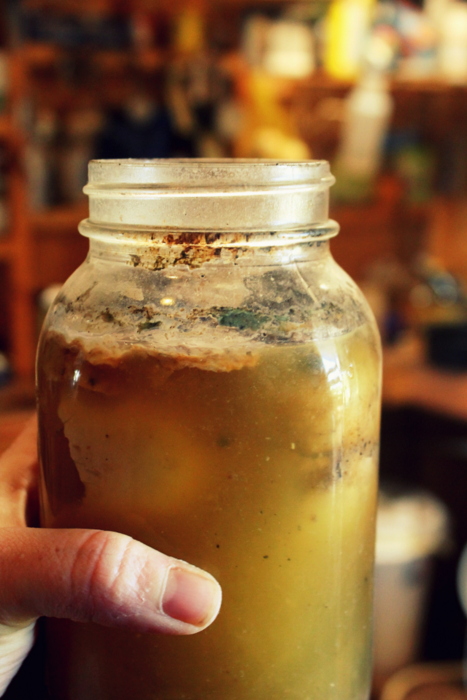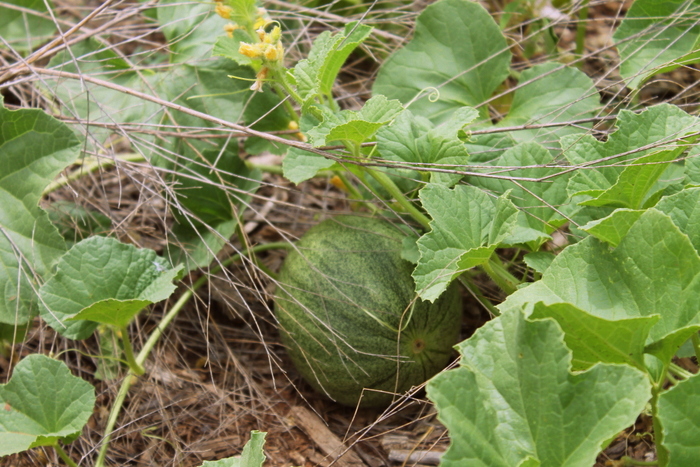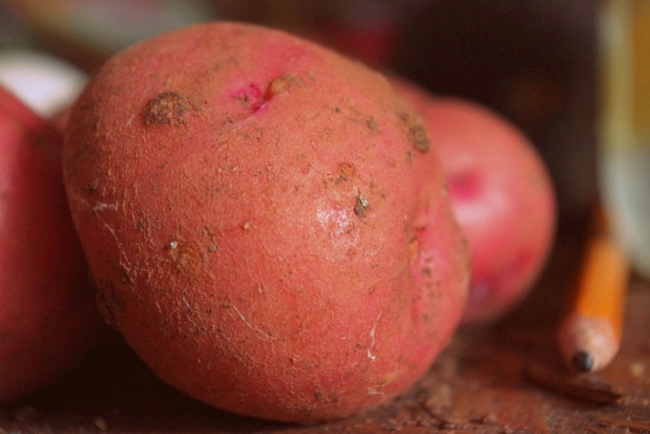Stinky Kitchen Compost Tea for the Garden
Here’s a confession for you: I have yet to successfully grow an actual heap of compost for our garden. One reason (or is it an excuse?) is that I’m intimidated, having never really delved into the necessary combination of carbon, nitrogen, and other plant matter. The real reason, though, is probably because I haven’t made much of an effort. Compost takes a bit of time and I’m not sure I have the patience or wherewithal for that during this time in my life.
Instead, I’ve been making this wreaking jar of goodness a few times a week. It’s quick and simple and hasn’t killed anything yet, so I figure something’s going right. Right? Oh, and everything I’ve put this stuff on is not only still alive, but seems to be doing well.
This compost tea uses up two common kitchen scraps that most of us use on a daily basis and it’s dead simple to make.
Quart jars are plentiful in my pile of dirty dishes so I often shove scraps of things into them for the boys to take outside to the chickens or the compost pile. (We really do have a pile, I just don’t manage it very well.)
So, I started crunching up two things we consume around here daily, egg shells and spent tea or coffee grounds, and place them into one of those dirty jars. Then I cover it with water and put a lid on it so as to not add one more rotten smelling odor to the air we breathe. (We have chickens, children, sweat, and fermentation happening around here on a daily basis so “stink” is something we’re kind of used to.)
I throw other scraps in there as I have them; fruit peels, vegetable scraps, or anything else with nutritional value are welcome.
And then fermentation happens, which is always exciting. It only takes a couple of days for bubbling to begin in this heat, but I’m guessing 3-7 days is a decent range, depending on your temperature. During this time, carbon dioxide will be given off, so you may need to “burp” your jars as you would a vegetable ferment. You do not want this stuff exploding all over your kitchen.
Once fermentation is happening, it’s ready for the garden. I strain it into a watering can, fill the rest of the two-gallon capacity with water, and apply it to areas in the garden that look like they could use a boost. And then I start a new batch the next time I make coffee or tea or eggs.
And that’s it!




A free fertilizer for the garden? Great idea! We always seem to have mason jars around too. I’ll give it a try.
Thank you for taking the time to explain how you do things like this. It’s appreciated.
I going to give this a try tomorrow. Thanks!
I’d love to try this–we certainly go through plenty of eggs and coffee and I love the idea of using all those kitchen scraps for something more instant-gratification-y than our compost pile. Should I worry about salmonella if I’m pouring this on our vegetables, though?
I did this last year, and for the same reason! I don’t know who understands all those ratios and nutrients I just want to enjoy my garden not do calculus lol, I add a little molasses and Epsom salt to mine, just because I heard its good for the plants and everything grew really well, thanks for the reminder I bought some organic fertilizer from Lowe’s and nothing is growing as well as last year
I like this lazy way of fertilizing my garden. I’ve been putting kitchen scraps in the compost bin for years and everything grows nicely around the bin. So the idea struck, why not just brew them in water directly. So I put kitchen scraps in the small green compost tub that is no longer used and just add water, the lid can be locked tight to prevent animals tipping it over, and I can pour out directly with the lid closed so it only strains out the liquid and I just replenish the water and add continue to add scraps. I plan to bury the remainder in the soil once the season is over to add more nutrients.
The plants love it and I love it as it is easy to get rid of scraps and avoid the flies and smell. And I didn’t have to do much work! I am glad I found your article to reaffirm this method.